一般现在时肯定句与其他动词
一般现在时

一般疑问句:Be+主语+表语?
Be的用法口诀 I用am; you 用are, is连着he, she,it; 单数名词用is,复数名词全用are。 变疑问,往前提,句末问号莫丢弃。 变否定,更容易,be后not莫忘记。 疑问否定任你变,句首大写莫迟疑.
1.It is a red pen. 2.He is Eric. 3.That is my map. 4.Her name is Mary. 5.I am Jenny.
把下面的句子变一般疑问句并作肯、否定 回答,否定句.
1.He has a TV. 2.She has an alarm clock. 3.Sally plays ping-pong every day. 4.My sister has a nice ring. 5.Her parents have 3 sons.
• • • • • • • • • • • • •
按要求做题: (10分) 1.He ______(have) a notebook. has 2.Maria and I_______(have) a basketball. have 3.Li Ping has a soccer ball.(变为一般疑问句) Does Ping have soccer ball? ____Li ____a 4.Does she have a CD?(做肯定回答) Yes,shedoes . ____ 5.He has a baseball bat.(变否定句) He doesn’t have baseball bat. ____ ________a 6.You have a volleyball.(一般疑问句) ______you have a volleyball? Do 7.The boy doesn’t have a TV.(肯定句) The boy ______ a TV. has
英语学习中常见的几种时态介绍

英语学习中常见的几种时态介绍中,常见的有一般现在时、现在进行时、一般将来时、一般过去时、过去进行时、现在完成时和一般过去将来时等时态,是我们在学习过程中必须掌握的。
掌握好这几种时态,对于学习英语的同学是大有益处的,在变换句式时经常要运用。
现我把学习过程中经常遇见的13种时态整理如下,供学习参考:一、一般现在时(The Indefinite Present Tense).一般现在时表示经常性的或习惯性的动作、特征或状态。
常见的一般现在时主要有以下三种句式:1.肯定句式。
一般现在时肯定句式主要由动词原形表示,第三人称单数的谓语动词后要加词尾-s或-es。
动词be根据主语不同的人称有不同的形式,第一人称单数中动词be用am,第一人称复数、第二人称单数和复数以及第三人称复数中动词be用are的形式,第三人称单数中动词be用is,动词have在主语是第三人称单数中变为has,其余情况均用原形have。
如:She is a worker.They are worker.He has a bike.We have a bike.I am the king of the world.2.疑问句式。
一般现在时变为疑问句时,一般在句首加助动词do或does的方式构成,第三人称单数时用does,其余情况都用do,主要动词一概不变,用原形;在以have或has为主要动词的句子中,可以直接将动词have或has提前放于句首,也可以在句首加动词do或does构成,have或has一律用原形have。
如:Do you work?Does he work?Has she a cake?Does she have a cake?其简略回答形式用“Yes+主语+动词”或“No+主语+动词+not”。
如:Yes, I do.No, he does not.Yes, she hasNo, she has not.3.否定句式。
一般现在时的否定句式在动词前加do/does not的形式构成。
一般现在时态讲解

一般现在时态讲解公司内部档案编码:[OPPTR-OPPT28-OPPTL98-OPPNN08]一般现在时态讲解一般现在时(de)用法:1.表示经常性、习惯性(de)动作或存在(de)状态.eg. I go to school on foot. He is very busy now.2.表示主语(de)特征、性格、能力、爱好等.eg. He can swim. I work hard. I like watching TV.3.表示客观真理 eg. There are seven days in a week. 否定句:主语+be+not+其他 eg. Danny is not a good student. 一般疑问句:Be+主语+其他 eg. Is Danny a good student(2)句中有实意动词,如work, go, get, help, study, play 等表示主语(de)动作肯定句:主语+谓语动词+其他 eg. I work hard at school.否定句:主语+don’t 或doesn ’t+谓语动词原形+其他 eg. I don’t work hard at school.疑问句:Do 或Does + 主语+ 动词原形+其他 eg. Do I work hard at school . They have lunch at 12:00.They don’t have lunch at 12:00. Do they have lunch at 12:00注意:单数第三人称做主语时,谓语动词要用单三形式,变否定句须在动词前加助动词doesn’t;变一般疑问句须在句首加助动词does.. Jenny speaks English very well.Jenny doesn’t speak English very well. Does Jenny speak English very well动词第三人称单数(de)变化规则如下: (1)直接在动词词尾加-s.ask---asks work---works get---gets stay---stays play — plays like — likes(2)以字母s, x, ch, sh 或o 结尾(de)动词,在词尾直接加-es.watch---watches wish---wishes fix---fixesdo---does go---goes pass---passes(3)以“辅音字母加 - y”结尾(de)动词,要先变y 为i 再加-es. try---tries study---studies cry---cries fly---flies (4)不规则变化: have----has一般现在时态(de)时间状语为often、 usually、 always、 sometimes等频率副词,on Saturdays、 in the morning(afternoon evening) 、every day 等.常见错误:be动词与实意动词同时出现在句子中例:We are plant (plant) the trees in spring.(误)正解:We plant (plant) the trees in spring.解析:在英语中,be是表状态,do是表动作,两种动词不能同时出现在句子中,可记住如下口诀:“英汉语言有差异,be 、do不能放一起,仔细琢磨细分析,语法千万要牢记.”一般现在时态练习一般现在时态(de)时间状语为often、 usually、 always、 sometimes,on Saturdays、 in the morning/afternoon/ evening 、every day、every week 等.I.用所给词(de)正确形式填空1. We often___________(play) on the playground.2. He _________(get) up at six o’clock everyday.3. __________you _________(brush) your teeth every morning4. What____ (do) he usually _____(do) after school5. Danny _______(study) English, Chinese, Math, Science and Art atschool.6. Mike sometimes __________(go) to the park with his sister.7. At eight at night, she ________(watch) TV with his parents. 8. ________ Mike________(read) English every day9. How many lessons ______your classmate_______(have) on Monday10. What time _______his mother_________(do) the housework11. He often ______(have) dinner at home.12. Daniel and Tommy________ (be) in Class One.13. We___________________ (not watch) TV on Monday.14. Nick _____________________(not go) to the zoo on Sunday.15. They___________ (like) the World Cup16. What ______they often __________(do) on Sat urdays17. Your parents___________ (read) newspapers every day.18. The girl___________ (teach) us English on Sundays.19. She and I _____________(take) a walk together every evening.20.There____________(be) somewaterin the bottle.21. Mike _____________(like) cooking.22.They____________(have) the same hobby.23. My aunt_____________ (look) after her baby carefully.24. Youalways__________(do) yourhomeworkwell.25. I___________ (be) ill. I’m staying in bed.26.She_________(go) to school from Monday toFriday.27. Liu Tao _________(do) not like PE.28. Thechildoften___________ (watch) TV in the evening.29. Su Hai andSuYang _________(have) eight lessons thisterm.30. -What day _________(be) it today -It’s Saturday.31. Don’t make a noise. Grandpa __________________(sleep).32. Tom’s family__________(watch) TV.33. ---What ______ your mother _______(do) every evening---She _______(wash) clothes.34. _______ it______(rain)every day35. --What _______ you _______(do) on Sundays --We ________ (play) football.36. There ________ (be) a football match on TV every morning.37. They often ________ (visit) the Gre at Wall.38. He _____________ (not come).39. The earth __________ (move) round the sun.40.Mr. Wang often______( go) to Shanghai.Π. 以My School Life为题写一篇小短文,不少于60词.__________________________________________________________________ __________________________________________________________________ __________________________________________________________________ __________________________________________________________________ __________________________________________________________________ __________________________________________________________________ __________________________________________________________________ __________________________________________________________________ __________________________________________________________________ ______________________________________________________。
六年级英语知识点时态
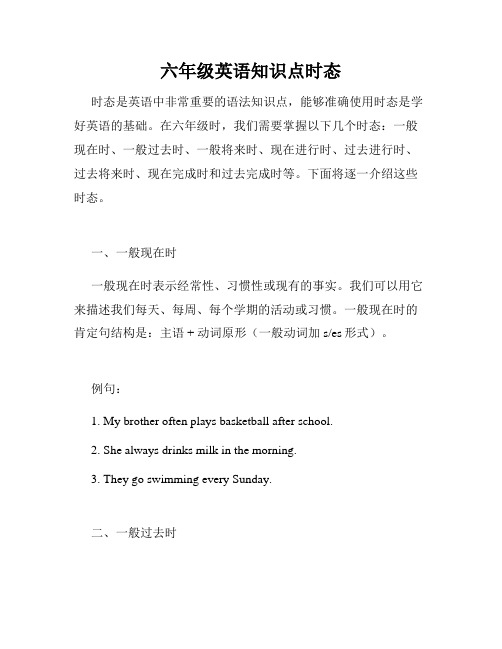
六年级英语知识点时态时态是英语中非常重要的语法知识点,能够准确使用时态是学好英语的基础。
在六年级时,我们需要掌握以下几个时态:一般现在时、一般过去时、一般将来时、现在进行时、过去进行时、过去将来时、现在完成时和过去完成时等。
下面将逐一介绍这些时态。
一、一般现在时一般现在时表示经常性、习惯性或现有的事实。
我们可以用它来描述我们每天、每周、每个学期的活动或习惯。
一般现在时的肯定句结构是:主语 + 动词原形(一般动词加s/es形式)。
例句:1. My brother often plays basketball after school.2. She always drinks milk in the morning.3. They go swimming every Sunday.二、一般过去时一般过去时表示发生在过去某个具体时间或某一段时间中的动作或状态。
一般过去时的肯定句结构是:主语 + 动词过去式。
例句:1. We went to the zoo yesterday.2. He played soccer last weekend.3. She studied Chinese history last year.三、一般将来时一般将来时表示将要发生的动作或存在的状态。
一般将来时的肯定句结构是:主语 + will + 动词原形。
例句:1. I will visit my grandparents next month.2. We will have a picnic in the park tomorrow.3. She will clean her room this evening.四、现在进行时现在进行时表示现在正在进行的动作。
现在进行时的肯定句结构是:主语 + am/is/are + 动词ing形式。
例句:1. They are playing tennis in the park now.2. She is reading a book at the moment.3. We are watching a movie.五、过去进行时过去进行时表示在过去某个时间点正在进行的动作。
一般现在时确定用
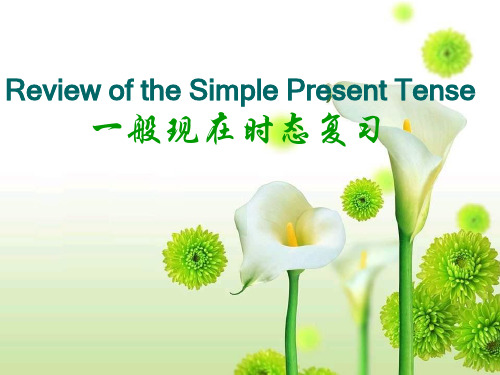
8 _____ your teacher _____(help) you learn math?
9 _____ Bill _____(do) his homework every day? 10 How many lessons ______ your classmate _____(have) on Monday? 11 What time_____ his mother____ (do) the housework? 12 What _____ he usually _____(do) after school?
1 I speak English.(变成一般疑问句并作肯定回答)
2 He speaks Chinese.(变成一般疑问句并作否定回答) 3 Jack likes playing computer.(变成一般疑问句并 作肯定回答) 4 We usually go to school by bus.(变成一般疑问 句并作否定回答)
1 We often _____(play) in the playground. 2 They _____(have) the same hobby. 3 Daniel and Tommy _____(be) in Class One. 4 She and I ______(take) a walk together every morning. 5You always ______(do) your homework well. 6 We often _____(not play) in the playground. 7 They _____(not have) the same hobby. 8 Daniel and Tommy _____(not be) in Class One.
小学英语语法_一般现在时详细讲解
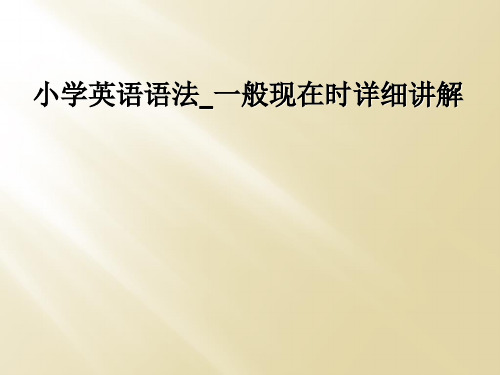
变否定句
They are students. They are not students.
变否定句
She can speak English. She can not speak English.
一般现在时
(否定句)
句中没有be动词或情态动 词时,主语为第三人称单数的 否定句在动词前加does not (doesn’t),非单三时,否定 句在动词前加do not(don’例t如)
She is often late for school.
2. 表示表示客观事实
You are 13. He is a student.
You study at Olympic Garden Middle School.
3. 表示永恒不变的真理;
The moon goes round the earth.
It looks like a cat. 它看起来像只猫。
二、单个人名、地名或称呼作主 语;是第三人称单数。
①Han Mei looks like her mother. 韩梅看起来像她的母亲
②Beijing is in China. 北京在中国。 ③Uncle Wang often makes cakes.
Do+主语+动原…? Does +三单主语+动原…?
Do you go to school…?
Does he go home…?
哪些主语是第三人称单数?
一、人称代词he, she, it是第三人称单 数。
He likes watching TV. 他喜欢看电视。 She has lunch at twelve. 她十二点吃午餐。
3、实义动词第三人称单数的动词形式变化规则
英语一般现在时的表示方法
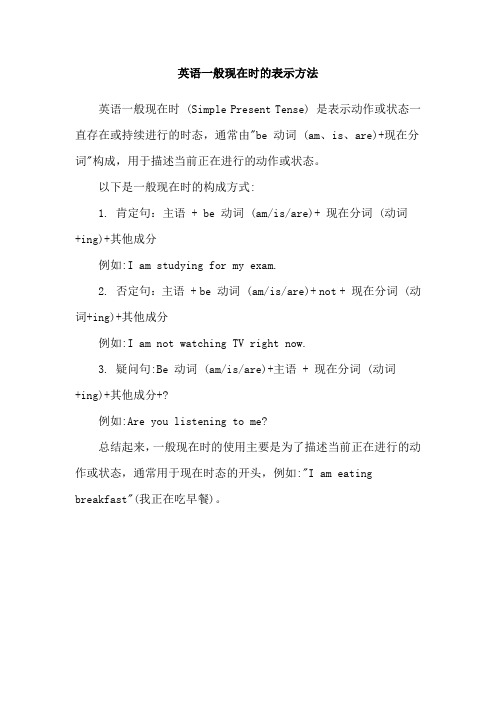
英语一般现在时的表示方法
英语一般现在时 (Simple Present Tense) 是表示动作或状态一直存在或持续进行的时态,通常由"be 动词 (am、is、are)+现在分词"构成,用于描述当前正在进行的动作或状态。
以下是一般现在时的构成方式:
1. 肯定句:主语 + be 动词 (am/is/are)+ 现在分词 (动词
+ing)+其他成分
例如:I am studying for my exam.
2. 否定句:主语 + be 动词 (am/is/are)+ not + 现在分词 (动词+ing)+其他成分
例如:I am not watching TV right now.
3. 疑问句:Be 动词 (am/is/are)+主语 + 现在分词 (动词
+ing)+其他成分+?
例如:Are you listening to me?
总结起来,一般现在时的使用主要是为了描述当前正在进行的动作或状态,通常用于现在时态的开头,例如:"I am eating breakfast"(我正在吃早餐)。
专题08 一般现在时_备战2021年小升初英语必考语法和题型(解析版)
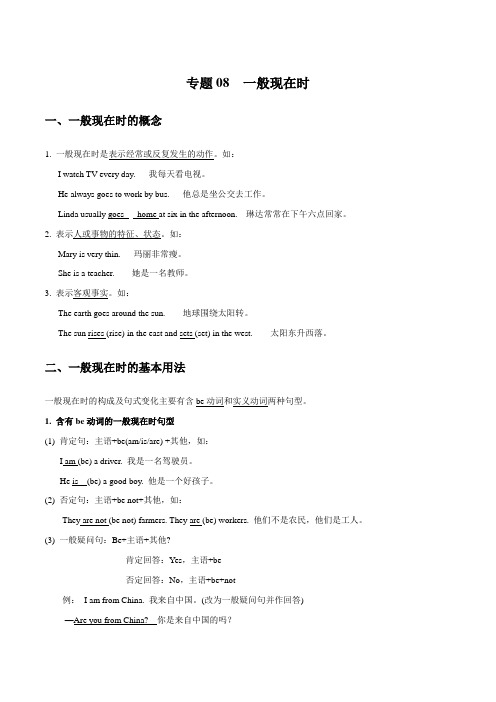
专题08 一般现在时一、一般现在时的概念1. 一般现在时是表示经常或反复发生的动作。
如:I watch TV every day. 我每天看电视。
He always goes to work by bus. 他总是坐公交去工作。
Linda usually goes home at six in the afternoon. 琳达常常在下午六点回家。
2. 表示人或事物的特征、状态。
如:Mary is very thin. 玛丽非常瘦。
She is a teacher. 她是一名教师。
3. 表示客观事实。
如:The earth goes around the sun. 地球围绕太阳转。
The sun rises (rise) in the east and sets (set) in the west. 太阳东升西落。
二、一般现在时的基本用法一般现在时的构成及句式变化主要有含be动词和实义动词两种句型。
1. 含有be动词的一般现在时句型(1) 肯定句:主语+be(am/is/are) +其他,如:I am (be) a driver. 我是一名驾驶员。
He is (be) a good boy. 他是一个好孩子。
(2) 否定句:主语+be not+其他,如:They are not (be not) farmers. They are (be) workers. 他们不是农民,他们是工人。
(3) 一般疑问句:Be+主语+其他?肯定回答:Yes,主语+be否定回答:No,主语+be+not例:I am from China. 我来自中国。
(改为一般疑问句并作回答)—Are you from China? 你是来自中国的吗?—Yes, I am. 是的,我是来自中国。
—No, I am not. 不是,我不是来自中国。
2. 含有实义动词的一般现在时句型。
(1) 肯定句:主语+动词原形+其他。
(主语为非第三人称单数时用)主语+动词三单+其他。
一般现在时动词变换规律
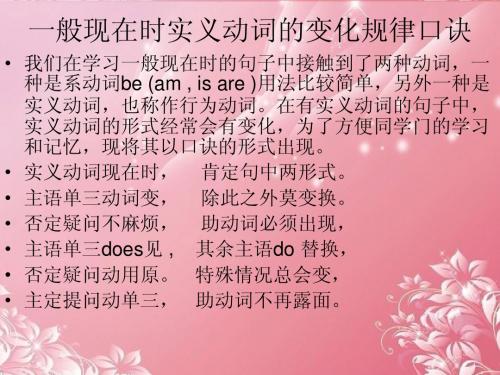
具体解释如下: 1.动词发生变化。在一般现在时的肯定句中,若主语是第三 人称单数,实义动词要发生变化,简称:肯定句,主 单三,动词变。(特殊注意:若主语不是第三人称单 数时,实义动词则不发生变化。) My mother often makes cakes for us They speak English every day We go to school by bike every day 2.要出现助动词。在一般现在时的否定句或疑问句中要出现 助动词do或does。若主语是第三人称单数,助动词用 does;若主语不是第三人称单数,助动词用do。 (特殊注意(1).在一般疑问句中,助动词要放在句首。 (2).在否定句中,助动词要放在主语的后面,实义动词的前 面。
一般现在时实义动词的变化规律口诀?我们在学习一般现在时的句子中接触到了两种动词一种是系动词beamisare用法比较简单另外一种是实义动词也称作行为动词
一般现在时实义动词的变化规律口诀
• 我们在学习一般现在时的句子中接触到了两种动词,一 种是系动词be (am , is are )用法比较简单,另外一种是 实义动词,也称作行为动词。在有实义动词的句子中, 实义动词的形式经常会有变化,为了方便同学门的学习 和记忆,现将其以口诀的形式出现。 • 实义动词现在时, 肯定句中两形式。 • 主语单三动词变, 除此之外莫变换。 • 否定疑问不麻烦, 助动词必须出现, • 主语单三does见 , 其余主语do 替换, • 否定疑问动用原。 特殊情况总会变, • 主定提问动单三, 助动词不再露面。
They don’t come from America Do you have an eraser ? • 特例:在对句子的主语或主语的定语进行提问时, 句子中不出现助动词,谓语动词用第三人称单数 形式。例如: Miss Zhang teaches us English.(对划线部分提问) Who teaches you English ? Who sits behind you ? Li Lei does • 重点语法相关练习: • 句型转换
一般现在时用法

一般现在时形式:1、主语(第一、二人称和复数)+ 动词原形+ 宾语2、主语(第三人称单数)+ 动词词尾要加-S + 宾语构成:一般现在时用行为动词的原形,但第三人称单数作主语时,动词的词尾要加S(一般的动词词尾加S;以sh、ch、s、x、o结尾的词加es;.以辅音字母Y结尾的把Y变成i再加es )一、一般现在时的用法:1)一般现在时表示现在的状态。
如:He is twelve years old.2) 经常性或习惯性的动作,常与表示频率的副词或时间状语连用。
时间状语:often, always, usually, sometimes , never、hardly ever、every morning、at night、at noon、in the evening、every day、twice a week 等。
如:I read English every morning.She sometimes goes shopping on Sundays.3) 客观真理,客观存在,科学事实。
如:The earth moves around the sun.Shanghai lies in the east of China.4) 表示格言或警句中。
如:Pride goes before a fall. 骄者必败。
5) 表示主语具备的性格和能力等。
如:She likes apples.They speak English.6)倒装句,表示动作正在进行,如:Here comes the bus. = The bus is coming. There goes the bell. = The bell is ringing.7) 一般现在时Be动词情况:am,is,are也可以做一般现在时的助动词如:I am a student.二、一般现在时的肯定句、否定句和一般疑问句:肯定句:I am…He、She、It is …We 、You 、They are…否定句:I am not…He、She、It is not…We 、You 、They are not…一般疑问句:Do you(they)…?Does she (he)…?如:We go to school at seven every day.We don’t go to school at seven every day.Do you go to school at seven every day?Yes,we do. No,we don’t.。
一般现在时的三种不同的用法
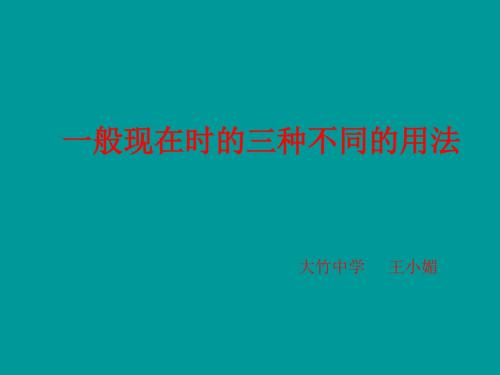
2) 表示目前一段时间内正在进行, 但说 话时可能没有进行的动作。
Right now I am studying Chinese by
distance learning. 我现在正通过远程教育学习汉语。
3) 与always, constantly, forever, all the time等副词连用, 表示动作反复 或习惯。此时句子常含有说话者的 强烈情感在内。表达较强的“责备” 或“表扬”之意。
The present continuous tense 现在进行时
(1) 现在进行时的基本结构
① 肯定句: 主语+ am/is/are+ 现在分词 ② 否定句: 主语+ am/is/are+ not+现在
分词 ③ 疑问句:Am/Is/Are +主语+现在分词
(2) 现在进行时的用法 1) 表示说话时正在进行的, 目前正在
as soon as, once, the moment引导的时间 状语从句,if,unless引导的条件状语从 句和even if , whoever,whatever, whenever,wherever,whoever引导的让步 状语从句中,从句一般用现在时表将来 7)表示按时刻表上将要发生的事情,通常是
----I’ll buy some for you, if I ___to
the post office.
A. go
B. shall go
C. will go
D. went
巩固练习
My First Day at Senior High Today is my first day at Senior High. I always _g_e_t__u_p_ (get up) very early. I _e_x_e_r_c_i_se__(exercise) this month, so I ___j_o_g____(jog) every morning. I _w__a_lk__(walk ) to school every day because I __li_v_e_ (live) not far away from the school.
一般现在时句变化

What
什么
How long
Where 哪里
How wide
When
什么时候
How tall
Who
谁
How heavy
Whom 谁(宾格)
How far
Which 哪一个
How...
How
如何,怎样
How old 多少岁
一般疑问句: 肯定回答: 否定回答:
划线部分提问:
Is Tom in the room? Yes, he is. No, he isn’t. Where is Tom?
They are good students.
否定句:
They are not good students.
一般疑问句: 肯定回答: 否定回答:
将下列陈述句改为特殊疑问句(划线部分提问):
1. They are on the playground. Where are they?
2. I am the only child in my family. What are you in youห้องสมุดไป่ตู้ family?
3. Wendy is a whizz-kid. Who is a whizz-kid.
主语为第三人称单数,句首+does 其他所有主语,句首+do 3. 动词永远是原形,句尾加“?”
将下列一般疑问句改为肯定句
1. Does he speak English? He speaks English.
2. Do you know him? I know him.
一般现在时肯定句否定句疑问句结构
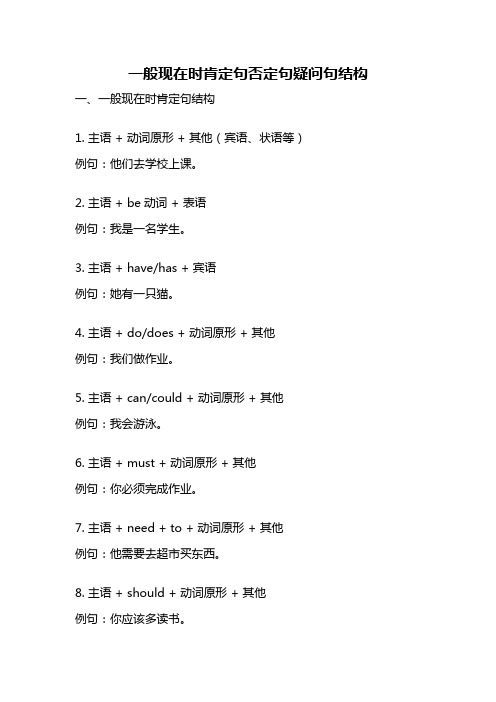
一般现在时肯定句否定句疑问句结构一、一般现在时肯定句结构1. 主语 + 动词原形 + 其他(宾语、状语等)例句:他们去学校上课。
2. 主语 + be动词 + 表语例句:我是一名学生。
3. 主语 + have/has + 宾语例句:她有一只猫。
4. 主语 + do/does + 动词原形 + 其他例句:我们做作业。
5. 主语 + can/could + 动词原形 + 其他例句:我会游泳。
6. 主语 + must + 动词原形 + 其他例句:你必须完成作业。
7. 主语 + need + to + 动词原形 + 其他例句:他需要去超市买东西。
8. 主语 + should + 动词原形 + 其他例句:你应该多读书。
9. 主语 + would + 动词原形 + 其他例句:我愿意帮助你。
10. 主语 + will + 动词原形 + 其他例句:他明天会来参加聚会。
二、一般现在时否定句结构1. 主语 + do not/does not + 动词原形 + 其他例句:他们不喜欢吃蔬菜。
2. 主语 + am not/is not/are not + 表语例句:我不是一个演员。
3. 主语 + have/has + not + 宾语例句:她没有一本好书。
4. 主语 + can't/couldn't + 动词原形 + 其他例句:我不能去参加聚会。
5. 主语 + must not + 动词原形 + 其他例句:你不能迟到。
6. 主语 + need + not + to + 动词原形 + 其他例句:他不需要帮助。
7. 主语 + should not + 动词原形 + 其他例句:你不应该浪费时间。
8. 主语 + would not + 动词原形 + 其他例句:我不会告诉他。
9. 主语 + will not + 动词原形 + 其他例句:他不会来参加聚会。
10. 主语 + am/are/is + not + 动词-ing + 其他例句:我不在听音乐。
动词时态的句子结构及关键词

动词时态的句子结构及关键词————————————————————————————————作者: ————————————————————————————————日期:动词时态的句子结构及关键词:一般现在时:句子结构:肯定句主语+be (am, is, are )+其他否定句主语+be not+其他疑问句Be+主语+其他或: 肯定句主语+动词原型+其他( 第三人称单数作主语动词要加"s")否定句主语+don't+动词原型+其他(第三人称单数作主语don't改为does n't)疑问句DO+主语+动词原型+其他(第三人称单数作主语do改为doess)关键词: sometimes,often, usually,always,everyday, on Sundayafternoon,at10 o'clockinthemorning,fivedays a week,threetimes a month等.注:在时间壮语从句,条件壮语从句中,常用一般现在时表示将来时,这时一般从句用一般现在时,主句用将来时现在进行时:句子结构:肯定句主语+be +动词的现在分词+其他否定句主语+be not+动词的现在分词+其他疑问句Be+主语+动词的现在分词+其他关键词:now, right now,atthe moment, It's+几点钟等的句子.或lo ok, listen, keep quiet等提示语.一般将来时:句子结构:肯定句主语+will+动词原型+其他否定句主语+will not+动词原型+其他疑问句Will +主语+动词原型+其他(will 可改为be going to ,当主语是第一人称时will可用shall)关键词:tomorrow, tomorrow morning,atseven o'clock tomorrow e vening,next year,atteno'clock next Sunday,this year,at the end of this term,from nowon, in theyear 2008, soon, in afew days' time, in thefuture 等.一般过去时:句子结构:肯定句主语+be(was,were)+其他否定句主语+be not+其他疑问句Be+主语+其他或: 肯定句主语+动词的过去式+其他否定句主语+didnot+动词原型+其他疑问句Did+主语+动词原型+其他关键词:yesterday,yesterday morning等,last week,lastyear,at theend of last term,一段时间+ago如:ten years ago, five hours ago, on January 1st,2004,in the1980s等.Just now,in the old days, long ago, a momentago等.过去进行时:句子结构: 肯定句主语+was/were+动词的现在分词+其他否定句主语+was/werenot +动词的现在分词+其他疑问句Was/Were + 主语+动词的现在分词+其他关键词:具体时间+过去的时间壮语如:at teno'clockyesterday morning,atthis timelast Sunday等.现在完成时:句子结构:肯定句主语+have/has+动词的过去分词+其他(第三人称单数用has)否定句主语+have/has not+动词的过去分词+其他疑问句Have/Has+主语+ 动词的过去分词+其他关键词:already, yet, just,ever,never,so far, for+一段时间,since+过去的时间或过去时从句.或this year alone"今年以来",thesefiveye ars alone"这五年以来",in the last tenyears"在过去的十年中"等.过去将来时:句子结构: 肯定句主语+would+动词原型+其他否定句主语+wouldnot + 动词原型+其他疑问句Would+主语+动词原型+其他(would可改为was/were going to,主语第一人称时would可用should)过去将来时主要用在宾语从句中.过去完成时:句子结构: 肯定句主语+had+ 动词的过去分词+其他否定句主语+had not +动词的过去分词+其他疑问句Had+主语+动词的过去分词+其他关键词:by+过去某一时间点如:by last year,bythe endof+过去某一时间点如:by the endof last year,before+过去某一时间点,by the time+从句,或宾语从句中最后,请记住:It's not the endof theworld, try to look on the bright side of thing,I'm sure itwill be all right.这不是世界末日,试着往事情好的方面看,我确认一切都会好起来.英语动词有两种语态:主动语态和被动语态。
一般现在时态
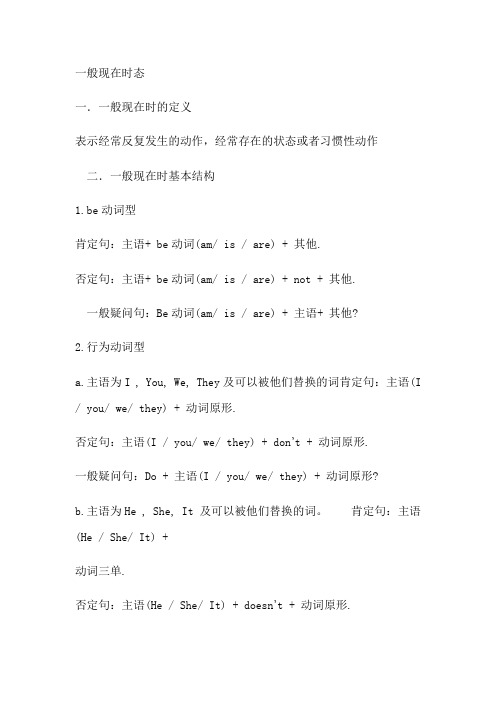
一般现在时态一.一般现在时的定义表示经常反复发生的动作,经常存在的状态或者习惯性动作二.一般现在时基本结构1.be动词型肯定句:主语+ be动词(am/ is / are) + 其他.否定句:主语+ be动词(am/ is / are) + not + 其他.一般疑问句:Be动词(am/ is / are) + 主语+ 其他?2.行为动词型a.主语为I , You, We, They及可以被他们替换的词肯定句:主语(I / you/ we/ they) + 动词原形.否定句:主语(I / you/ we/ they) + don’t + 动词原形.一般疑问句:Do + 主语(I / you/ we/ they) + 动词原形?b.主语为He , She, It 及可以被他们替换的词。
肯定句:主语(He / She/ It) +动词三单.否定句:主语(He / She/ It) + doesn’t + 动词原形.一般疑问句:Does + 主语(he / she/ it) + 动词原形三.动词的第三人称单数形式变化规则。
变化规则1. 直接在动词后+ s : read-reads stop-stops2. 以s, x, ch, sh, o 结尾的词+ es: bus-buses box-boxes3.以辅音字母+y结尾的词,变y为i, 再加es :study-studies fly-flies4.不规则变化 : have-has三、用所给动词的一般现在时填空。
1. We often ______(play) in the playground.2. He ________(get) up at six o’clock.3. you (brush) your teeth every morning?4. What ___(do) he usually ______(do) after school?5. Danny _____(study) English, Chinese, Maths, Science, and Art an school.6. Mike sometimes _____ (go) to the park with his sister.7. At eight at night, she ________(watch) TV with his family.8. _____Mike _____(read) English every day?9. How many lessons ______ your classmate _____(have) on Monday?10. What time _____ his mother ______(do) the housework?四、按要求改写句子。
一般现在时语法课
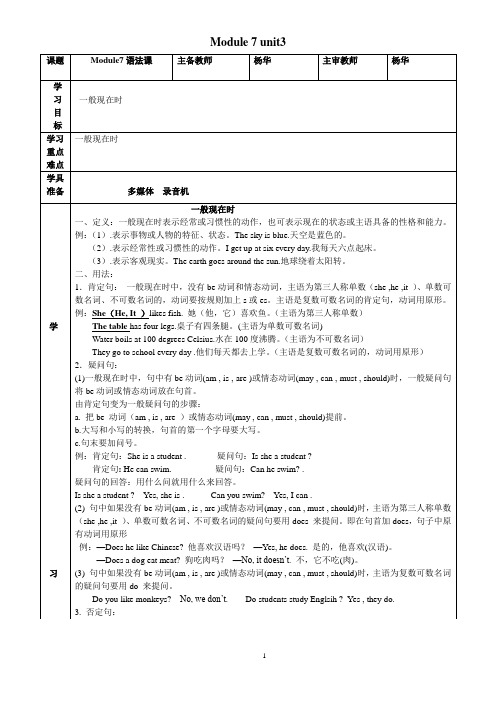
(3)句中没有be动词(am , is , are )或情态动词(may , can , must , should)时,主语为复数可数名词的否定句,在动词原形前加do + not (don’t)。
They don’t go to school on Sundays.
3.否定句:
(1)句中有be动词(am , is , are )或情态动词(may , can , must , should)时,否定句在be动词和情态动词后加not,
I am not a teacher. He can not fly .
(2)句中没有be动词(am , is , are )或情态动词(may , can , must , should)时,主语为第三人称单数的否定句,在动词原形前加does + not (doesn’t)。
6. She likes the black bag very much . (变为否定句)
7. I buy the pants for only 50 Yuan. (用she改写句子)the pants for only 50 Yuan.
8. It’san English dictionary. (对画线部分提问)
在一般现在时中,当主语是第三人称单数时,谓语动词要用第三人称单数形式,即常在动词原形后加-s或-es。但有些同学们对于哪些主语是第三人称单数还不十分清楚,现归纳总结如下:
一、人称代词he, she, it是第三人称单数。如:
Helikes watching TV.他喜欢看电视。
Shehas lunch at twelve.她十二点吃午餐。
The tablehas four legs.桌子有四条腿。(主语为单数可数名词)
一般现在时的用法
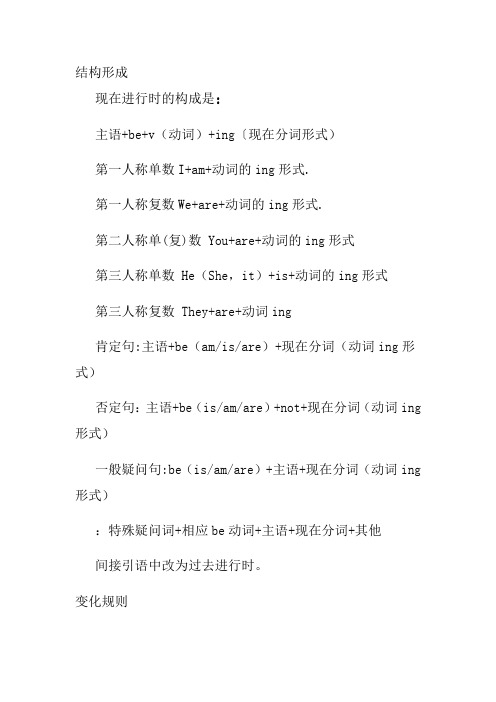
结构形成现在进行时的构成是:主语+be+v(动词)+ing〔现在分词形式)第一人称单数I+am+动词的ing形式.第一人称复数We+are+动词的ing形式.第二人称单(复)数 You+are+动词的ing形式第三人称单数 He(She,it)+is+动词的ing形式第三人称复数 They+are+动词ing肯定句:主语+be(am/is/are)+现在分词(动词ing形式)否定句:主语+be(is/am/are)+not+现在分词(动词ing 形式)一般疑问句:be(is/am/are)+主语+现在分词(动词ing 形式):特殊疑问词+相应be动词+主语+现在分词+其他间接引语中改为过去进行时。
变化规则1.一般情况下直接在后面+ ing(例:sleep+ing 变sleeping)2.以不发音的e结尾的动词,去掉e再+ing(例:bite-e+ing 变biting)3.以结尾的词,要双写尾字母再加ing(例:swim+m+ing=swimming ?sit+t+ing=sitting)4.以ie结尾的,变ie为y+ing (例:die-dyinglie-lying)5.结尾为c且c读作/k/时,在结尾加k再加ing,如picnic-picnicking现在进行时的基本用法A表示现在( 指说话人说话时) 正在发生的事情在进行。
We are waiting for you.B. 表示现阶段正在进行的动作,说话时未必正在进行。
Mr. Green is writing another novel.(说话时并未在写,只处于写作的状态.)She is learning piano under Mr. Smith.C.已经确定或安排好的但不确定会不会发生的将来活动。
I'm leaving for a trek in Nepal next week.(我下周要去尼泊尔旅行)We're flying to Paris tomorrow.(我们明天乘飞机去巴黎)句型构成现在进行时助动词be 动词的现在分词(ing形式)。
- 1、下载文档前请自行甄别文档内容的完整性,平台不提供额外的编辑、内容补充、找答案等附加服务。
- 2、"仅部分预览"的文档,不可在线预览部分如存在完整性等问题,可反馈申请退款(可完整预览的文档不适用该条件!)。
- 3、如文档侵犯您的权益,请联系客服反馈,我们会尽快为您处理(人工客服工作时间:9:00-18:30)。
一般现在时肯定句与其他动词
Present Simple Positive with other verbs Make positive present simple sentences:
1.(he / go to school every day)
He goes to school every day
2.(I / like swimming)
3.(you / play badminton on Saturdays)
4.(the class / begin at 9 a.m.)
5.(they / sometimes go to the cinema)
6.(she / love chocolate)
7.(we / study French)
8.(they / live in London)
9.(he / work in a restaurant)
10.(Lucy / play the guitar)
11.(we / cook every day)
12.(he / clean the house at the weekends)
13.(I / like reading detective stories)
14.(you / come from France)
15.(John and David / often go to restaurants)
16.(Susie / study English every night)
17.(the train / leave at 6 p.m.)
18.(we / go to the park on Sundays)
19.(he / likes taking photographs)
20.(the moon / go round the earth)
Answers:
1.He goes to school every day.
2.I like swimming.
3.You play badminton on Saturdays.
4.The class begins at 9 a.m.
5.They sometimes go to the cinema.
6.She loves chocolate.
7.We study French.
8.They live in London.
9.He works in a restaurant.
10.Lucy plays the guitar.
11.We cook every day.
12.He cleans the house at the weekends.
13.I like reading detective stories.
14.You come from France.
15.John and David often go to restaurants.
16.Susie studies English every night.
17.The train leaves at 6 p.m.
18.We go to the park on Sundays.
19.He likes taking photographs.
20.The moon goes round the earth.。
